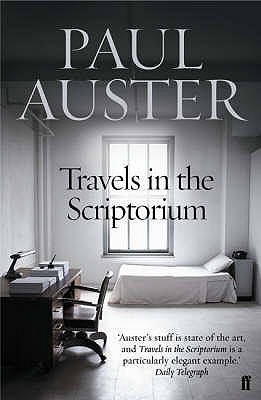My knowledge of Paul Auster and his work is due to the fact that his reputation precedes him. Despite his serious tone, his works are playful and metaphysical; they have a postmodern sensibility. The only novel of his I’ve read is Oracle Night and its thanks to this that I was able to get a slight foothold on Travels In The Scriptorium, as this one is strictly for Auster fans, being a meditation on all that has gone before – for reader, for writer.
An old man – dubbed Mr. Blank – wakes every day in a spartan room with no knowledge of the day before. Basic objects are labelled (lamp, wall, desk) and, tucked into the ceiling, a camera takes a new snap every second. He doesn’t know if he’s locked in – the fear of this being true makes him not want to know.
Then a woman named Anna comes to visit, talking of medication and treatment, helping him with washing and dressing. Yet there’s a depth to her actions that suggest she’s more than just a carer – she cares. And so Mr Blank’s day unfolds, receiving visits and reading from a manuscript on his desk, as he tries to work out who he is and why he is there.
Travels In The Scriptorium is told in the style of a report based off the photos from the secret camera and the sounds from a microphone, also secret. The prose therefore is clinical and distant (“From the look of disgust that comes over his face as he scans these sentences, we can be fairly confident that Mr. Blank has not lost the ability to read.”) offering us every movement and expression; every word spoken, muttered, sighed.
Tucked into the novel is another novel, in the form of a manuscript on Mr. Blank’s desk. It’s about a man locked in a room writing a manuscript that will be used against him. And so, since Auster was presumably sitting in a room writing about Mr. Blank writing about another in similar circumstances what we have here is a the literary equivalent of matryoshka dolls. From what I can gather the people who pay visits to Mr. Blank are characters from previous novels, bitter about the way he used them on “missions”:
I might be ridiculous, Flood says, with anger rising in his voice, but you, Mr. Blank…you’re cruel…cruel and indifferent to the pain of others. You play with people’s lives and take no responsibility for what you’ve done. I’m not going to sit here and bore you with my troubles, but I blame you for what’s happened to me. I most sincerely blame you, and I despise you for it.
To the casual reader, like me, Travels In The Scriptorium is probably best left until more familiarity with Auster’s work is assured. There’s so much here that passed me by. But, at the same time, it brings a voice to characters left to their damaged lives once the author has moved on to other works and perhaps shows an insight into Auster’s feelings about writing:
I’m sick of these goddamned shoes. If anything, I’d rather take the other one off, too.
It’s an engaging read but I feel that more travels will be required, however, before I can truly make sense of this issue from Auster’s scriptorium.
